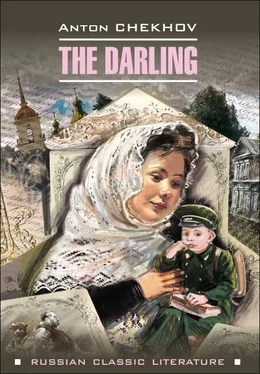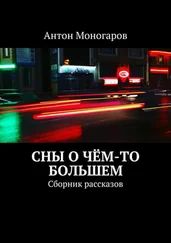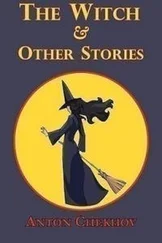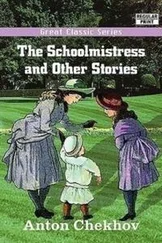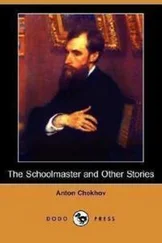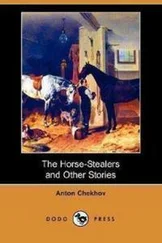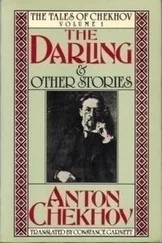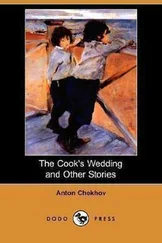She had grown somewhat stouter of late, and her movements were already a little matronly, a little indolent.
“It’s bad to be without love though,” said Yartsev, walking behind her. “We talk and read of nothing else but love, but we do very little loving ourselves, and that’s really bad.”
“All that’s nonsense, Ivan Gavrilitch,” said Yulia. “That’s not what gives happiness.”
They had tea in the little garden, where mignonette, stocks, and tobacco plants were in flower, and spikes of early gladiolus were just opening. Yartsev and Kotchevoy could see from Yulia’s face that she was passing through a happy period of inward peace and serenity, that she wanted nothing but what she had, and they, too, had a feeling of peace and comfort in their hearts. Whatever was said sounded apt and clever; the pines were lovely – the fragrance of them was exquisite as it had never been before; and the cream was very nice; and Sasha was a good, intelligent child.
After tea Yartsev sang songs, accompanying himself on the piano, while Yulia and Kotchevoy sat listening in silence, though Yulia got up from time to time, and went softly indoors, to take a look at the baby and at Lida, who had been in bed for the last two days feverish and eating nothing.
“My friend, my tender friend,” sang Yartsev. “No, my friends, I’ll be hanged if I understand why you are all so against love!” he said, flinging back his head. “If I weren’t busy for fifteen hours of the twenty-four, I should certainly fall in love.”
Supper was served on the verandah; it was warm and still, but Yulia wrapped herself in a shawl and complained of the damp. When it got dark, she seemed not quite herself; she kept shivering and begging her visitors to stay a little longer. She regaled them with wine, and after supper ordered brandy to keep them from going. She didn’t want to be left alone with the children and the servants.
“We summer visitors are getting up a performance for the children,” she said. “We have got everything – a stage and actors; we are only at a loss for a play. Two dozen plays of different sorts have been sent us, but there isn’t one that is suitable. Now, you are fond of the theatre, and are so good at history,” she said, addressing Yartsev. “Write an historical play for us.”
“Well, I might.”
The men drank up all the brandy, and prepared to go. It was past ten, and for summer-residents that was late.
“How dark it is! One can’t see a bit,” said Yulia, as she went with them to the gate. “I don’t know how you’ll find your way. But isn’t it cold?”
She wrapped herself up more closely and walked back to the porch.
“I suppose my Alexey’s playing cards somewhere,” she called to them. “Good night!”
After sitting in the lighted rooms they could see nothing. Yartsev and Kostya groped their way like blind men to the railway embankment and crossed it.
“One can’t see a thing,” said Kostya in his bass voice, standing still and gazing at the sky. “And the stars, the stars, they are like new three-penny bits. Gavrilitch!”
“Ah?” Yartsev responded somewhere in the darkness.
“I say, one can’t see a thing. Where are you?”
Yartsev went up to him whistling, and took his arm.
“Hi there, you summer visitors!” Kostya shouted at the top of his voice. “We’ve caught a socialist.”
When he was exhilarated he was always very rowdy, shouting, wrangling with policemen and cabdrivers, singing, and laughing violently.
“Nature be damned,” he shouted.
“Come, come,” said Yartsev, trying to pacify him. “You mustn’t. Please don’t.”
Soon the friends grew accustomed to the darkness, and were able to distinguish the outlines of the tall pines and telegraph posts. From time to time the sound of whistles reached them from the station and the telegraph wires hummed plaintively. From the copse itself there came no sound, and there was a feeling of pride, strength, and mystery in its silence, and on the right it seemed that the tops of the pines were almost touching the sky. The friends found their path and walked along it. There it was quite dark, and it was only from the long strip of sky dotted with stars, and from the firmly trodden earth under their feet, that they could tell they were walking along a path. They walked along side by side in silence, and it seemed to both of them that people were coming to meet them. Their tipsy exhilaration passed off. The fancy came into Yartsev’s mind that perhaps that copse was haunted by the spirits of the Muscovite Tsars, boyars, and patriarchs, and he was on the point of telling Kostya about it, but he checked himself.
When they reached the town gate there was a faint light of dawn in the sky. Still in silence, Yartsev and Kotchevoy walked along the wooden pavement, by the cheap summer cottages, eating-houses, timber-stacks. Under the arch of interlacing branches, the damp air was fragrant of lime-trees, and then a broad, long street opened before them, and on it not a soul, not a light … When they reached the Red Pond, it was daylight.
“Moscow is a town that will have to suffer a great deal more,” said Yartsev, looking at the Alexyevsky Monastery.
“What put that into your head?”
“I don’t know. I love Moscow.”
Both Yartsev and Kostya had been born in Moscow, and adored the town, and felt for some reason antagonistic to every other town. Both were convinced that Moscow was a remarkable town, and Russia a remarkable country. In the Crimea, in the Caucasus, and abroad, they felt dull, uncomfortable, and ill at ease, and they thought their grey Moscow weather very pleasant and healthy. And when the rain lashed at the window-panes and it got dark early, and when the walls of the churches and houses looked a drab, dismal colour, days when one doesn’t know what to put on when one is going out – such days excited them agreeably.
At last near the station they took a cab.
“It really would be nice to write an historical play,” said Yartsev, “but not about the Lyapunovs 62 62 the Lyapunovs, the Godunovs – old Russian nobility
or the Godunovs 63 63 the Lyapunovs, the Godunovs – old Russian nobility
, but of the times of Yaroslav 64 64 Yaroslav, Monomach – Russian princes, rulers of the country
or of Monomach 65 65 Yaroslav, Monomach – Russian princes, rulers of the country
… I hate all historical plays except the monologue of Pimen. When you have to do with some historical authority or even read a textbook of Russian history, you feel that every one in Russia is exceptionally talented, gifted, and interesting; but when I see an historical play at the theatre, Russian life begins to seem stupid, morbid, and not original.”
Near Dmitrovka the friends separated, and Yartsev went on to his lodging in Nikitsky Street. He sat half dozing, swaying from side to side, and pondering on the play. He suddenly imagined a terrible din, a clanging noise, and shouts in some unknown language, that might have been Kalmuck 66 66 Kalmuck – a Mongolian language used by the part of the Kalmuck people
, and a village wrapped in flames, and forests near by covered with hoar-frost and soft pink in the glow of the fire, visible for miles around, and so clearly that every little fir-tree could be distinguished, and savage men darting about the village on horseback and on foot, and as red as the glow in the sky.
“The Polovtsy 67 67 The Polovtsy – the people of Russian steppes (11th century)
,” thought Yartsev.
One of them, a terrible old man with a bloodstained face all scorched from the fire, binds to his saddle a young girl with a white Russian face, and the girl looks sorrowful, understanding. Yartsev flung back his head and woke up.
Читать дальше
Конец ознакомительного отрывка
Купить книгу
